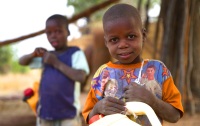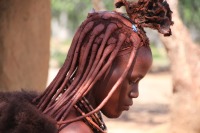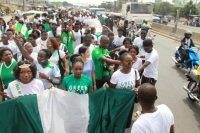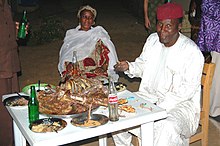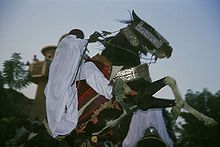
В 1960 году на карте Африки в числе молодых суверенных государств появилось государство Нигерия. Эта страна, как и многие другие африканские страны, пережила тяжелое прошлое. Эпоха работорговли, начавшаяся в 15 веке, сменилась в 19 веке колониализмом. На протяжении длительного периода времени страна была беспощадно эксплуатируемой английской колонией. Добившись политической независимости, Нигерия получила возможность самостоятельного экономического развития.
Сегодня Нигерия — федеративная республика. В состав федерации входят 36 штатов и федеральный округ Абуджа. Столица Нигерии Абуджа сменила Лагос в 1991 году. Перенести столицу из Лагоса в Абуджу решено в 1976 году. Каждый штат имеет не только свое название, но и местные климатические и территориальные характеристики.
Нигерия — это удивительное государство контрастов. На юге омывается водами Атлантического океана. На западе соседствует с Бенином, на востоке – с Камеруном, на севере — с Нигером. Нигерия богата живописными ландшафтами, заповедниками, водопадами, лазурными океанскими побережьями и многими другими природными богатствами.
Фото по лицензии PxHere
Нигерия также по праву носит название страны лесов и саванн. Когда-то влажные тропические леса занимали большую часть ее территории, но вырубки и выжигание под посевы сократили их площадь. Теперь тропические леса с оплетенными лианами деревьями высотой до 45 метров распространены только на Приморской равнине и в долинах рек.
В нигерийских лесах сохранилось мало крупных млекопитающих: слонов, жирафов, носорогов. Более распространены леопард, шакалы, гиены, антилопы, буйволы, встречается чешуйчатый муравьед. Много различных видов павианов, мартышек, а также лемуров. В реках и озере Чад водятся бегемоты, крокодилы, в прибрежных водах Гвинейского залива встречается почти вымершее млекопитающее — морская корова. Масса птиц — ярких попугаев, красноголовых дятлов удодов, турпанов, пеликанов. Из хищных птиц — африканский черный коршун, ястреб, гриф, птица-секретарь, птица-носорог.
Фото по лицензии PxHere
Нигерия имеет две ярко выраженные климатические зоны. Вдоль побережья климат жаркий и очень влажный в течение всего года. На севере страны температура в зависимости от времени года значительно меняется, влажность гораздо меньше.
Этнический состав Нигерии чрезвычайно сложен — здесь проживает более 250 этнических групп. Народы Нигерии отличаются друг от друга по языку, культуре, уровню своего развития. Больше половины всего населения составляют три народа — хауса, йоруба, игбо.
Фото по лицензии PxHere
Основное занятие жителей — земледелие. Земля повсеместно считается собственностью всей общины. Контроль за распределением земли осуществляют вождь, старейшина деревни, глава семьи. Работы между мужчинами и женщинами строго распределены. Мужчины выполняют наиболее трудоемкие работы, связанные с расчисткой нового участка от деревьев и кустарников и подготовкой его к посеву. Женщины занимаются посадкой, прополкой и сбором урожая.
Основными достопримечательностями в стране можно по праву считать ее музеи, один из которых — Национальный Музей Нигерии расположен в Лагосе. Здесь среди бесчисленных экспонатов есть бесценная для мировой культуры коллекция, состоящая из редкостных предметов искусства, охватывающих практически все периоды развития Нигерии как страны.
Удивительная страна — Нигерия, вот такая она — «Африка в миниатюре!».
Всего в разделе — 6 праздников.
Зеленым цветом обозначены фестивали, памятные даты и т.п., имеющие большое значение для
страны, но не являющиеся праздниками в прямом смысле этого слова. Красным цветом отмечены
государственные выходные.
From Wikipedia, the free encyclopedia
A traditional courtyard feast of mutton or goat in Diffa, around Mouloud, April 2006.
The government and people of Niger observe twelve official public holidays.[1][2] These include international commemorations, the commemoration of important dates in the history of Niger, and religious holidays. Both Christian and Muslim holidays are observed as official public holidays. While the former colonial power, France, instituted Christian observances, the vast majority of Nigeriens are Muslim.
Muslim holidays are dependent on the Islamic calendar, and—like Christian Easter—move from year to year. Some Muslim holidays are also dependent upon astronomical sightings (e.g.: the observance of moonrise for Ramadan). National commemorations and secular international holidays are fixed on the Gregorian calendar, the standard civil calendar used in Niger as most of the world.
Nigeriens celebrate a number of other holidays, festivals, and commemorations which are not public holidays. Some are yearly civic commemorations, some religious, ethnic, or regional festivals which may be widely celebrated only by specific groups or in specific areas. Other yearly events, such as cultural festivals, markets, or sporting events may be much anticipated events without being legal holidays.
Official holidays[edit]
Below are the twelve official public holidays recognized by the Government of Niger.[3] Businesses, schools, and public services are closed on these days. They are often dates of public festivals, political speeches, and large gatherings.
Fixed holidays[edit]
| Date | African name | Remarks |
|---|---|---|
| January 1 | New Year’s Day | |
| April 24 | Concord Day | Commemorates the peace accords ending the Tuareg Rebellion in 1995 |
| May 1 | Labour Day | «la fête du travail (1er mai)«: Nigerien observance of International Workers’ Day |
| August 3 | Nigerien Independence Day | Commemoration of Niger’s 1960 independence from France |
| December 18 | Nigerien Republic Day | Commemoration of the First Republic of Niger, semi-independent under France, 1959 |
| December 25 | Christmas Day |
The following are official public holidays whose date may vary, according to their corresponding calendar. Some Muslim holiday observance is also dependent upon local astronomical observance. For the period 2008–2013, the order they occur:
| Month: 2008–2013 | Name and Translation | Remarks |
|---|---|---|
| January—December | Eid al Adha | Commemoration of Abraham’s sacrifice: feasting on Lamb or Goat. Especially important family gathering in Niger.[4] |
| January—December | Islamic New Year | Muharram |
| March–April | Easter Monday | Christian holiday of the Resurrection, breaking the Lenten fast. |
| March—January | Mawlid | The Prophet’s Birthday, locally Mouloud:[5] celebrated with overnight gatherings of families and communities. |
| October—August | Laylat al-Qadr | Nightly prayers and reflection in the last 10 nights of Ramadan. |
| November—September | Eid al Fitr | Evening feasts and parties to celebrate the breaking of the Ramadan fast. Regional gatherings and festival include the carnival festivities at the Sultan’s Palace in Zinder. |
Other festivals[edit]
Nigeriens celebrate a number of holidays and festivals. Many are regional, recognized partially or only locally by government, or are traditions of specific ethnic groups. They include:[6][7]
- The Cure salée : annual gathering of Tuareg and Fulani[8] nomadic clans at Ingall (August or September);
- Guérewol : The «Bororo» Fulani matchmaking festival at the end of the rainy season (August or September). Famous for the traditional makeup and dancing of young Fulani men eager to woo a spouse, Guérewol take place both in conjunction with the Cure salée, as well as at other traditional gather spots of nomadic people in northern Niger;
- «National Day of Nigerien Women» — «Journée nationale de la femme nigérienne» (13 May). Commemorates a 1992 march by women in Niamey during the National Conference period, demanding greater involvement of women in national institutions. Made a «National Commemoration» 25 November 1992.[9]
- «Festival national de la jeunesse, des sports et de la culture»: Government sponsored national youth sport and cultural competition (annual);
- National championship of Lutte Traditionnelle (traditional wrestling). Contestants progress from Regional championships to team completion which awards a prestigious trophy—a ceremonial sabre—to one region;
- «Foires agro-sylvo pastorales»: annual Agropastoral governance and cultural forum, Niamey;
- «Prix Dan Gourmou» : Annual music competition and festival, Niamey;
- «FIMA», «Festival International de la Mode Africaine» (International Festival of African Fashion) every two years in Niamey;
- «Rencontres Théâtrales du Niger»: National theater festival ;
- «Festival international de conte»/ » Gatan — Gatan «: Festival of traditional story telling;
- «Salon international de l’artisanat pour la femme» (SAFEM): Women Artisans festival, Niamey;
- «Festival de l’Aïr» (27–29 December): Music and arts festival at Iférouane;
- » Hotoungo » at Gangui, a local traditional farmers gathering and festival;
- » Bianou » festival at Agadez;
- » Wassan Kara » festival at Zinder;
- The » Guetna » at Tassara, Annual festival among the nomadic Diffa Arabs.;
- Annual Anza animist religious festival at Massalata — Konni, near Dogondutchi;
- Traditional fishermen’s festival at Karay-Kopto on the River Niger;
- » Gossi «, a Soninké animist festival at Karma-Songhaï on the River Niger;
- «Fête de la girafe» (15 September), Kouré, near Niamey, celebrating the West African Giraffe native to the area;
- le » Sharow » Puel festival;
- Traditional boxing tournaments («Faka») each year after harvest in December or January, Zinder Region;
- » Mani Hori «: festival of traditional Songhai women’s crafts, each year after harvest in December or January.
References[edit]
- ^ NIGER — JOURS FÉRIÉS / PUBLIC HOLIDAYS Archived 2011-07-21 at the Wayback Machine. SERVICE DE L’INFORMATION AÉRONAUTIQUE — A S E C N A (Niamey), 2005-01-19.
- ^ Jean-Paul Labourdette, Dominique Auzias. Niger 2009. Petit Futé: Paris (2008) ISBN 978-2-7469-1640-1 p.208.
- ^ List
- ^ Nigerart: La Tabaski Archived 2004-11-18 at the Wayback Machine Monique Benamrane. 29-05-2002.
- ^ Célébration du mouloud à Niamey : Dans la paix et la communion. Le Sahel, Niamey. 10 March 2009.
- ^ LE NIGER — TOURISME: Les Fêtes Archived 2009-06-22 at the Wayback Machine. Aniya: Coopération nigero-française. Ministère des affaires étrangères et européennes (France). accessed 2009-04-30
- ^ Geels (2006) pp. 75-79
- ^ French: Peul; Fula: Fulɓe
- ^ Commémoration de la Journée nationale de la femme: «Hommes et Femmes, tous unis, pour une meilleure représentation des femmes aux instances de prise de décisions», thème de la Journée. Ousmane Fatouma Saley, Le Sahel. 12 May 2009.
- Geels, Jolijn (2006). Niger. Chalfont St Peter, Bucks / Guilford, Connecticut: Bradt UK / Globe Pequot Press. ISBN 978-1-84162-152-4.: 74, 75–79
From Wikipedia, the free encyclopedia
A traditional courtyard feast of mutton or goat in Diffa, around Mouloud, April 2006.
The government and people of Niger observe twelve official public holidays.[1][2] These include international commemorations, the commemoration of important dates in the history of Niger, and religious holidays. Both Christian and Muslim holidays are observed as official public holidays. While the former colonial power, France, instituted Christian observances, the vast majority of Nigeriens are Muslim.
Muslim holidays are dependent on the Islamic calendar, and—like Christian Easter—move from year to year. Some Muslim holidays are also dependent upon astronomical sightings (e.g.: the observance of moonrise for Ramadan). National commemorations and secular international holidays are fixed on the Gregorian calendar, the standard civil calendar used in Niger as most of the world.
Nigeriens celebrate a number of other holidays, festivals, and commemorations which are not public holidays. Some are yearly civic commemorations, some religious, ethnic, or regional festivals which may be widely celebrated only by specific groups or in specific areas. Other yearly events, such as cultural festivals, markets, or sporting events may be much anticipated events without being legal holidays.
Official holidays[edit]
Below are the twelve official public holidays recognized by the Government of Niger.[3] Businesses, schools, and public services are closed on these days. They are often dates of public festivals, political speeches, and large gatherings.
Fixed holidays[edit]
| Date | African name | Remarks |
|---|---|---|
| January 1 | New Year’s Day | |
| April 24 | Concord Day | Commemorates the peace accords ending the Tuareg Rebellion in 1995 |
| May 1 | Labour Day | «la fête du travail (1er mai)«: Nigerien observance of International Workers’ Day |
| August 3 | Nigerien Independence Day | Commemoration of Niger’s 1960 independence from France |
| December 18 | Nigerien Republic Day | Commemoration of the First Republic of Niger, semi-independent under France, 1959 |
| December 25 | Christmas Day |
The following are official public holidays whose date may vary, according to their corresponding calendar. Some Muslim holiday observance is also dependent upon local astronomical observance. For the period 2008–2013, the order they occur:
| Month: 2008–2013 | Name and Translation | Remarks |
|---|---|---|
| January—December | Eid al Adha | Commemoration of Abraham’s sacrifice: feasting on Lamb or Goat. Especially important family gathering in Niger.[4] |
| January—December | Islamic New Year | Muharram |
| March–April | Easter Monday | Christian holiday of the Resurrection, breaking the Lenten fast. |
| March—January | Mawlid | The Prophet’s Birthday, locally Mouloud:[5] celebrated with overnight gatherings of families and communities. |
| October—August | Laylat al-Qadr | Nightly prayers and reflection in the last 10 nights of Ramadan. |
| November—September | Eid al Fitr | Evening feasts and parties to celebrate the breaking of the Ramadan fast. Regional gatherings and festival include the carnival festivities at the Sultan’s Palace in Zinder. |
Other festivals[edit]
Nigeriens celebrate a number of holidays and festivals. Many are regional, recognized partially or only locally by government, or are traditions of specific ethnic groups. They include:[6][7]
- The Cure salée : annual gathering of Tuareg and Fulani[8] nomadic clans at Ingall (August or September);
- Guérewol : The «Bororo» Fulani matchmaking festival at the end of the rainy season (August or September). Famous for the traditional makeup and dancing of young Fulani men eager to woo a spouse, Guérewol take place both in conjunction with the Cure salée, as well as at other traditional gather spots of nomadic people in northern Niger;
- «National Day of Nigerien Women» — «Journée nationale de la femme nigérienne» (13 May). Commemorates a 1992 march by women in Niamey during the National Conference period, demanding greater involvement of women in national institutions. Made a «National Commemoration» 25 November 1992.[9]
- «Festival national de la jeunesse, des sports et de la culture»: Government sponsored national youth sport and cultural competition (annual);
- National championship of Lutte Traditionnelle (traditional wrestling). Contestants progress from Regional championships to team completion which awards a prestigious trophy—a ceremonial sabre—to one region;
- «Foires agro-sylvo pastorales»: annual Agropastoral governance and cultural forum, Niamey;
- «Prix Dan Gourmou» : Annual music competition and festival, Niamey;
- «FIMA», «Festival International de la Mode Africaine» (International Festival of African Fashion) every two years in Niamey;
- «Rencontres Théâtrales du Niger»: National theater festival ;
- «Festival international de conte»/ » Gatan — Gatan «: Festival of traditional story telling;
- «Salon international de l’artisanat pour la femme» (SAFEM): Women Artisans festival, Niamey;
- «Festival de l’Aïr» (27–29 December): Music and arts festival at Iférouane;
- » Hotoungo » at Gangui, a local traditional farmers gathering and festival;
- » Bianou » festival at Agadez;
- » Wassan Kara » festival at Zinder;
- The » Guetna » at Tassara, Annual festival among the nomadic Diffa Arabs.;
- Annual Anza animist religious festival at Massalata — Konni, near Dogondutchi;
- Traditional fishermen’s festival at Karay-Kopto on the River Niger;
- » Gossi «, a Soninké animist festival at Karma-Songhaï on the River Niger;
- «Fête de la girafe» (15 September), Kouré, near Niamey, celebrating the West African Giraffe native to the area;
- le » Sharow » Puel festival;
- Traditional boxing tournaments («Faka») each year after harvest in December or January, Zinder Region;
- » Mani Hori «: festival of traditional Songhai women’s crafts, each year after harvest in December or January.
References[edit]
- ^ NIGER — JOURS FÉRIÉS / PUBLIC HOLIDAYS Archived 2011-07-21 at the Wayback Machine. SERVICE DE L’INFORMATION AÉRONAUTIQUE — A S E C N A (Niamey), 2005-01-19.
- ^ Jean-Paul Labourdette, Dominique Auzias. Niger 2009. Petit Futé: Paris (2008) ISBN 978-2-7469-1640-1 p.208.
- ^ List
- ^ Nigerart: La Tabaski Archived 2004-11-18 at the Wayback Machine Monique Benamrane. 29-05-2002.
- ^ Célébration du mouloud à Niamey : Dans la paix et la communion. Le Sahel, Niamey. 10 March 2009.
- ^ LE NIGER — TOURISME: Les Fêtes Archived 2009-06-22 at the Wayback Machine. Aniya: Coopération nigero-française. Ministère des affaires étrangères et européennes (France). accessed 2009-04-30
- ^ Geels (2006) pp. 75-79
- ^ French: Peul; Fula: Fulɓe
- ^ Commémoration de la Journée nationale de la femme: «Hommes et Femmes, tous unis, pour une meilleure représentation des femmes aux instances de prise de décisions», thème de la Journée. Ousmane Fatouma Saley, Le Sahel. 12 May 2009.
- Geels, Jolijn (2006). Niger. Chalfont St Peter, Bucks / Guilford, Connecticut: Bradt UK / Globe Pequot Press. ISBN 978-1-84162-152-4.: 74, 75–79
Toggle sidebar
Search
Toggle the table of contents
5 languages
- 한국어
- 日本語
- Português
- Русский
- Yorùbá
Edit links
From Wikipedia, the free encyclopedia
|
|
This article includes a list of general references, but it lacks sufficient corresponding inline citations. Please help to improve this article by introducing more precise citations. (May 2017) (Learn how and when to remove this template message) |
Nigeria has many public holidays.
Public holidays[edit]
| Holiday | Date | Notes |
|---|---|---|
| New Year’s Day | 1 January | Commemorates the beginning of the calendar year. |
| Armed Forces Remembrance Day | 15 January | Commemorates the end of the Nigerian Civil War. |
| Workers’ Day | 1 May | Commemorates Workers’ labor movement internationally. |
| Children’s Day | 27 May | School holiday for Children. |
| Democracy Day | 12 June | Commemorates the return to Democracy in Nigeria. |
| Independence Day | 1 October | Commemorates the Independence of Nigeria from Britain. |
| Christmas Day | 25 December | Christian holiday commemorating the birth of Jesus. |
| Boxing Day | 26 December | Christian holiday commemorating the day after Christmas. |
Movable holidays[edit]
In addition, Nigeria officially celebrates a few moveable holidays, which occur on different dates every year:
| Holiday | Date | Notes |
|---|---|---|
| Mawlid | 12 Rabi’ al-awwal | Muslim holiday celebrating the birthday of Prophet Muhammad. |
| Eid al-Adha | 10 Dhu al-Hijjah | Muslim holiday celebrating the willingness of Ibrahim to sacrifice his son. |
| Eid al-Fitr | 1 Shawwal | Muslim holiday celebrating the end of Ramadan, a month of fasting. |
| Good Friday | Friday of Holy Week (March or April) | Christian holiday celebrating the crucifixion of Jesus. |
| Easter Monday | Monday after Easter (March or April) | Christian holiday celebrating the Resurrection of Jesus Christ. |
References[edit]
- Office holidays in Nigeria
- All Public Holidays In Nigeria
Public holidays in Africa |
|
|---|---|
| Sovereign states |
|
|
States with limited |
|
|
Dependencies and |
|
Retrieved from «https://en.wikipedia.org/w/index.php?title=Public_holidays_in_Nigeria&oldid=1126141059»
Categories:
- Public holidays in Nigeria
- Nigerian culture
- Events in Nigeria
- Lists of public holidays by country
- Lists of events in Nigeria
Hidden categories:
- Articles with short description
- Short description is different from Wikidata
- Articles lacking in-text citations from May 2017
- All articles lacking in-text citations
Toggle sidebar
Search
Toggle the table of contents
5 languages
- 한국어
- 日本語
- Português
- Русский
- Yorùbá
Edit links
From Wikipedia, the free encyclopedia
|
|
This article includes a list of general references, but it lacks sufficient corresponding inline citations. Please help to improve this article by introducing more precise citations. (May 2017) (Learn how and when to remove this template message) |
Nigeria has many public holidays.
Public holidays[edit]
| Holiday | Date | Notes |
|---|---|---|
| New Year’s Day | 1 January | Commemorates the beginning of the calendar year. |
| Armed Forces Remembrance Day | 15 January | Commemorates the end of the Nigerian Civil War. |
| Workers’ Day | 1 May | Commemorates Workers’ labor movement internationally. |
| Children’s Day | 27 May | School holiday for Children. |
| Democracy Day | 12 June | Commemorates the return to Democracy in Nigeria. |
| Independence Day | 1 October | Commemorates the Independence of Nigeria from Britain. |
| Christmas Day | 25 December | Christian holiday commemorating the birth of Jesus. |
| Boxing Day | 26 December | Christian holiday commemorating the day after Christmas. |
Movable holidays[edit]
In addition, Nigeria officially celebrates a few moveable holidays, which occur on different dates every year:
| Holiday | Date | Notes |
|---|---|---|
| Mawlid | 12 Rabi’ al-awwal | Muslim holiday celebrating the birthday of Prophet Muhammad. |
| Eid al-Adha | 10 Dhu al-Hijjah | Muslim holiday celebrating the willingness of Ibrahim to sacrifice his son. |
| Eid al-Fitr | 1 Shawwal | Muslim holiday celebrating the end of Ramadan, a month of fasting. |
| Good Friday | Friday of Holy Week (March or April) | Christian holiday celebrating the crucifixion of Jesus. |
| Easter Monday | Monday after Easter (March or April) | Christian holiday celebrating the Resurrection of Jesus Christ. |
References[edit]
- Office holidays in Nigeria
- All Public Holidays In Nigeria
Public holidays in Africa |
|
|---|---|
| Sovereign states |
|
|
States with limited |
|
|
Dependencies and |
|
Retrieved from «https://en.wikipedia.org/w/index.php?title=Public_holidays_in_Nigeria&oldid=1126141059»
Categories:
- Public holidays in Nigeria
- Nigerian culture
- Events in Nigeria
- Lists of public holidays by country
- Lists of events in Nigeria
Hidden categories:
- Articles with short description
- Short description is different from Wikidata
- Articles lacking in-text citations from May 2017
- All articles lacking in-text citations
Официальные праздники и выходные дни в Нигерии на 2022 год. Даты ближайших праздников.
Ближайшие праздники в Нигерии в 2022 году
1 янв. 2022 г.
Праздник
Нигерия
14 февр. 2022 г.
Соблюдение
Нигерия
8 мар. 2022 г.
Соблюдение
Нигерия
20 мар. 2022 г.
Сезон
Нигерия
27 мар. 2022 г.
Соблюдение
Нигерия
15 апр. 2022 г.
Праздник
Нигерия
16 апр. 2022 г.
Соблюдение,Христианин
Нигерия
17 апр. 2022 г.
Соблюдение,Христианин
Нигерия
18 апр. 2022 г.
Праздник
Нигерия
1 мая 2022 г.
Праздник
Нигерия
3 мая 2022 г.
Праздник
Нигерия
4 мая 2022 г.
Праздник
Нигерия
27 мая 2022 г.
Соблюдение
Нигерия
12 июн. 2022 г.
Праздник
Нигерия
19 июн. 2022 г.
Соблюдение
Нигерия
21 июн. 2022 г.
Сезон
Нигерия
10 июл. 2022 г.
Праздник
Нигерия
11 июл. 2022 г.
Праздник
Нигерия
30 июл. 2022 г.
Местный праздник
Нигерия
23 сент. 2022 г.
Сезон
Нигерия
1 окт. 2022 г.
Праздник
Нигерия
8 окт. 2022 г.
Праздник
Нигерия
21 дек. 2022 г.
Сезон
Нигерия
22 дек. 2022 г.
Местный праздник
Нигерия
24 дек. 2022 г.
Соблюдение,Христианин
Нигерия
25 дек. 2022 г.
Праздник
Нигерия
26 дек. 2022 г.
Праздник
Нигерия
31 дек. 2022 г.
Соблюдение
Нигерия

